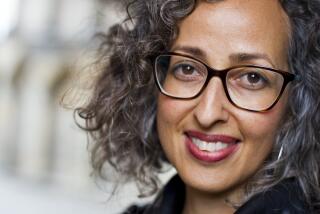A Living Bridge Between Islam, Christianity
- Share via
College student Mariam Zubin recently discovered a soul mate at Borders bookstore in Torrance. Specifically, she found her on the back cover of “Muslims Next Door: Uncovering Myths and Creating Friendships.”
There, Zubin read a short biography of author Shirin Taber, a Lake Forest resident whose mother was an Irish Catholic and father is an Iranian Muslim.
Zubin, who also grew up in a Christian-Muslim household, felt that, finally, someone with love and respect for both Christian and Islamic cultures had written a primer that dispelled Muslim stereotypes and made followers of the prophet Muhammad more approachable to believers of Christ.
The book conveys an understanding of how the Muslim culture and religion have been misunderstood, said Zubin, a 24-year-old student at Cal State Dominguez Hills who bought half a dozen copies of the book for her Christian friends.
“It gives people perspective,” Zubin said.
First-time author Taber, 38, said the idea for the book came in the months after the terrorist attacks of Sept. 11, when she worried that an anti-Muslim backlash would create a lasting schism between mainstream Muslims and the rest of America.
“But with interest so high about Islam, it also was a great opportunity for Christians to get to know Muslims and their faith better,” said Taber, a married mother of three.
On “kind of a whim,” Taber dashed off an outline of the book and some sample chapters and sent it to Zondervan, a leading Christian publishing company.
“I don’t know if I even did spell-check,” she said.
Zondervan pounced on the offer, intrigued by Taber’s insider knowledge of both the Christian and Muslim worlds and her desire, as an evangelical Christian, to dispel myths about Islam.
“People can sometimes misunderstand Christians and misunderstand Muslims,” said Paul Engle, Zondervan senior editor. “She has seen the heart of [Islamic] people who have been misunderstood. This book represents a kinder and gentler side of Christianity.”
Growing up, Taber lived both in the United States and in Iran, following her father, who was a representative with Iran Air. She attended junior high in the United States during the Iranian Revolution and the hostage crisis that began there in 1979, and felt the backlash from her classmates.
“I always saw myself as an American,” she said. “But people started focusing on me as an Iranian. A group of kids teased us, pushed us, talked about taking us hostage. I felt a deep sense of shame about being Iranian.”
She heard the echo of those taunts after Sept. 11, which gave her the impetus for the book. After getting the green light from Zondervan, Taber spent eight weeks writing “Muslims Next Door” in two-hour periods when a baby-sitter came to her home to watch her toddler.
The words came easily. “It was like water flowing from the tap,” she said.
Taber’s biggest challenge was tone. To keep the book from upsetting Muslims or Christians, she did not address divisive theological differences. She also touched only softly on proselytizing, choosing instead to focus on how to forge friendships.
“I wrote my book with deep respect for my Muslim friends and family members,” Taber said. “My heart’s desire is to show the human side of Muslims living in our nation.”
The 138-page book, targeted to evangelical Christians, is divided into two parts. The first half uncovers common myths about Islam -- for example, that Muslims and Christians having nothing in common spiritually; that all Muslims are Arab; that all Muslims are radical fundamentalists; and that women are oppressed by Islam.
“Like a tightrope artist, a Muslim woman in the West carefully maneuvers through life,” she writes, “avoiding falling headlong into either Islamic fundamentalism or Western secularism. Either one would be the death of her feminine soul.”
The second half of the book gives practical tips on how to create friendships with Muslims at school, work and home.
There’s a chapter on proper entertaining: Avoid serving alcohol and pork, be sure to seat husbands and wives together, dress modestly and forget about the time.
“Unlike Westerners, many Muslims are event-oriented rather than time-oriented,” she writes, warning guests not to look at their watches or get uptight if things run late. “That means a special event or relationship has priority over time constraints.”
Zubin, the college student, whose father is a Muslim from Afghanistan, said her Baptist mother finished “Muslims Next Door” and wistfully said, ‘I wish I had this before I met your father’s family.’ It would have saved her a lot of trouble.”
More to Read
Sign up for our Book Club newsletter
Get the latest news, events and more from the Los Angeles Times Book Club, and help us get L.A. reading and talking.
You may occasionally receive promotional content from the Los Angeles Times.










